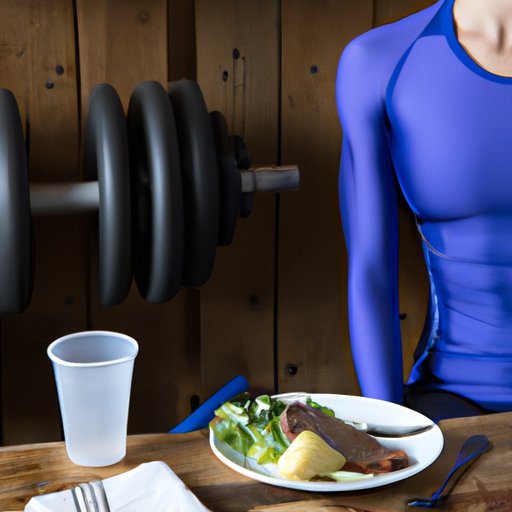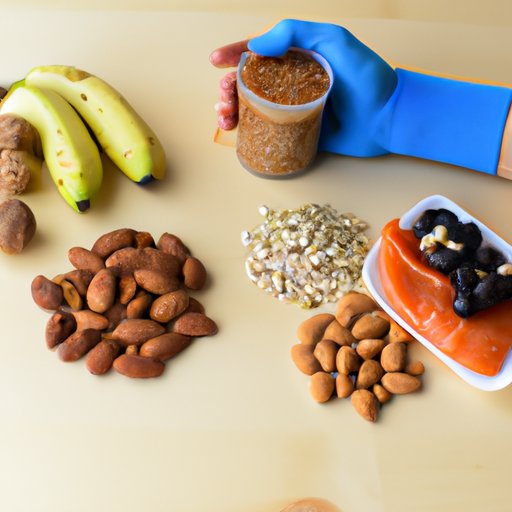Introduction
Whether you’re an avid gym-goer or just starting out on a new fitness journey, understanding the importance of pre-workout nutrition is essential. Eating before exercising can help you maximize your performance and reach your fitness goals faster. But do you really have to eat before working out? In this article, we explore the pros and cons of eating before working out, the science behind pre-workout nutrition, what to eat for maximum energy, and more.

Exploring the Pros and Cons of Eating Before Working Out
Eating before working out has both benefits and potential downsides. Let’s take a look at each in turn.
Benefits of Eating Before Working Out
The main benefit of eating before exercising is that it helps to keep your energy levels up. By providing your body with fuel, you’ll be able to work out harder and longer. Eating before exercising can also help to reduce muscle fatigue and prevent injury by providing your muscles with the nutrients they need to recover properly.
Potential Downsides of Eating Before Working Out
On the other hand, eating too close to working out can cause discomfort, such as nausea, bloating, and cramping. Additionally, if you eat too much before exercising, you may feel sluggish and heavy during your workout, which can lead to a decrease in performance. Lastly, eating before working out can raise your blood sugar levels, which can be dangerous for those with diabetes.

The Science Behind Eating Before Working Out
Now that we’ve explored the pros and cons of eating before exercising, let’s take a closer look at the science behind pre-workout nutrition.
Metabolic Responses to Food Intake
Your body responds differently to different types of food. Carbohydrates are broken down into glucose, which is then used as fuel for your muscles during exercise. Fats are broken down into fatty acids, which are used as fuel when carbohydrates are not available. Protein is broken down into amino acids, which are used for muscle repair and growth.
Glycogen Stores and Exercise Performance
Carbohydrates are stored in your body as glycogen. The amount of glycogen in your body affects your exercise performance. When your glycogen stores are low, it can lead to fatigue, decreased performance, and decreased motivation. Eating carbohydrates before working out can help to replenish your glycogen stores and provide you with the energy you need to perform at your best.
Role of Protein in Pre-Workout Nutrition
Protein plays an important role in pre-workout nutrition. Protein helps to build and repair muscle tissue, and it can also help to increase your strength and endurance. Eating protein before exercising can help to prevent muscle breakdown and aid in muscle recovery after your workout.

What to Eat Before Working Out for Maximum Energy
Now that we’ve discussed the science behind pre-workout nutrition, let’s take a look at what to eat before working out for maximum energy.
Carbohydrates
Carbohydrates are the primary source of energy for your body during exercise. Eating carbohydrates before working out can help to increase your performance and reduce fatigue. Some good sources of carbohydrates include whole grains, fruits, vegetables, and dairy products.
Healthy Fats
Healthy fats can also provide your body with energy during exercise. Healthy fats include olive oil, avocados, nuts, and seeds. Eating healthy fats before exercising can help to keep you feeling full and energized throughout your workout.
Proteins
Protein provides your body with the building blocks it needs to repair and rebuild muscle tissue. Eating protein before working out can help to increase your strength and endurance and reduce muscle fatigue. Good sources of protein include lean meats, eggs, legumes, and dairy products.
A Guide to Pre-Workout Nutrition for Different Types of Exercise
Different types of exercise require different types of pre-workout nutrition. Here’s a guide to pre-workout nutrition for different types of exercise:
Cardio
For cardio exercises, such as running, swimming, and cycling, it’s best to focus on carbohydrates and healthy fats. Eating a small meal or snack one to two hours before your workout can help to provide you with the energy you need to perform at your best.
Weight Training
For weight training, it’s important to eat a combination of carbohydrates and protein. Eating a meal or snack one to two hours before your workout can help to fuel your muscles and improve your performance. Eating a small snack 30 minutes before your workout can also help to boost your energy levels.
High Intensity Interval Training (HIIT)
For high intensity interval training (HIIT), it’s best to focus on carbohydrates and protein. Eating a small meal or snack one to two hours before your workout can help to provide you with the energy you need to perform at your best. Eating a small snack 30 minutes before your workout can also help to boost your energy levels.
How to Fuel Your Workout with the Right Foods
In addition to knowing what to eat before working out, it’s also important to know how to fuel your workout with the right foods. Here are some tips:
Timing
It’s important to time your meals and snacks correctly. Eating a meal or snack one to two hours before your workout can help to provide you with the energy you need to perform at your best. Eating a small snack 30 minutes before your workout can also help to boost your energy levels.
Portion Sizes
When it comes to portion sizes, it’s important to find the right balance. Eating too much can lead to discomfort during your workout, while eating too little can leave you feeling tired and sluggish. It’s best to aim for a portion size that’s enough to provide you with energy but not so much that it causes discomfort.
Choosing Nutrient-Dense Foods
It’s also important to choose nutrient-dense foods. This means selecting foods that are rich in vitamins, minerals, and other nutrients. Nutrient-dense foods include fruits, vegetables, whole grains, lean proteins, and healthy fats.
What to Know About Eating Before and After Working Out
In addition to pre-workout nutrition, it’s also important to consider post-workout nutrition. Here’s what you need to know:
Pre-Workout Meal Ideas
Some ideas for pre-workout meals include oatmeal with fruit and nuts, a turkey sandwich on whole grain bread, or a smoothie made with yogurt, banana, and nut butter.
Post-Workout Snacks
Post-workout snacks should contain both carbohydrates and protein to help refuel your body and promote muscle recovery. Some ideas for post-workout snacks include Greek yogurt with berries, a hard-boiled egg and an apple, or a protein shake with banana and almond butter.
Hydration
Staying hydrated is essential before and after exercising. Be sure to drink plenty of water throughout the day and bring a water bottle with you to the gym.
Conclusion
Eating before working out can provide your body with the energy it needs to perform at its best. However, it’s important to understand the pros and cons of pre-workout nutrition, the science behind it, and what to eat for maximum energy. Knowing how to fuel your workout with the right foods and timing your meals and snacks correctly can help to ensure that you get the most out of your workouts.
(Note: Is this article not meeting your expectations? Do you have knowledge or insights to share? Unlock new opportunities and expand your reach by joining our authors team. Click Registration to join us and share your expertise with our readers.)
